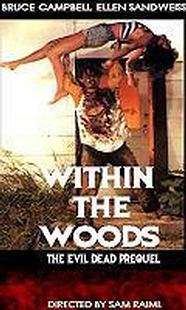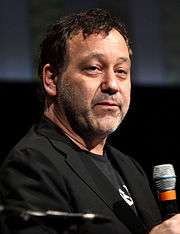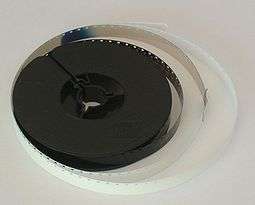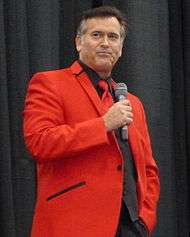Within the Woods
Within the Woods is a 1978 horror short film written, directed and produced by Sam Raimi. Raimi drew inspiration from his earlier short film Clockwork, deciding to produce a proof of concept horror film to help build the interest of potential investors. Raimi cast his friends Bruce Campbell and Ellen Sandweiss as the two protagonists and produced the film for $1,600. Shot on location in a remote cabin in the woods, production was a difficult process because of the low budget. Several of the special effects presented in the film were done in a severely low budget manner, some of which were improvised on set. The film centers around demonic possession and mysterious forces originating from the woods.
| Within the Woods | |
|---|---|
 VHS bootleg cover | |
| Directed by | Sam Raimi |
| Produced by | Rip Tapert |
| Written by | Sam Raimi |
| Starring |
|
| Cinematography | Tim Philo |
| Edited by | Sam Raimi |
Release date | October 30, 1978 |
Running time | 32 minutes |
| Language | English |
Raimi convinced a local theater manager to screen the film alongside The Rocky Horror Picture Show, which sparked minor interest. Initially a meager success, the film screened well to test audiences and inspired a larger budget remake directed by Raimi, called The Evil Dead (1981). The film was the first in the Evil Dead franchise, and launched the careers of both Campbell and Raimi. Several of the aesthetic qualities found in Within the Woods later defined Raimi's films.
Plot
Two romantic couples, consisting of four teenagers, decide to spend a weekend together located in a remote cabin found in the woods. An unseen force stalks and watches the group without their knowledge. Ellen and her boyfriend Bruce enter the woods to have a picnic lunch. The other couple, Scotty and Shelly, remain at the cabin playing Monopoly to pass time. During their lunch, Bruce announces to Ellen that they're camping on an Indian burial ground. Ellen is concerned, but Bruce assures her that they will be fine as long as they don't disturb the graves of the dead. Bruce then explores the area and discovers an ancient dagger belonging to the Indians. Ignoring his own advice, he takes the dagger with him.
After lunch, Ellen takes a nap. When she awakes, she finds Bruce missing and wanders into the woods looking for him. To her horror, she finds Bruce's dead body, horribly mutilated with apparent knife wounds. She is then startled by the presence of a demonic entity hiding within the woods, and quickly runs back to the cabin. While fleeing, she is attacked by unseen forces. She runs back to the cabin and screams to be let in immediately, being let in just as the entity is approaching her. Ellen tells her friends that Bruce has been murdered, but Scotty dismisses the whole thing as a joke and goes to find Bruce. Shelly and Ellen are concerned when Scotty doesn't return right away. Shelly walks outside to begin a search for the missing men, but a possessed Bruce assaults and strangles her, eventually stabbing her in the neck and killing her with the dagger that he found, moaning "join us."
Ellen encounters her possessed friend and flees into another room, grabbing knives to protect her. Something attempts to enter the room where Ellen is hiding, and she blindly lashes out with a knife - mistakenly stabbing Scotty who had just returned to the cabin. While horrified, Ellen is then attacked by the possessed Bruce. Ellen manages to trap Bruce outside, stabbing Bruce's hand several times in the process. The bleeding Scotty tells Ellen to look into the cellar for the gun they brought along. While walking down the stairs to the cellar, she trips on a broken step and injures herself. After finding the gun, she goes back up stairs and discovers that Scotty had been stabbed to death while she was downstairs. The demonic Bruce then attacks her, but she manages to cut off his hand.
Ellen attempts to flee but is severely beaten by the possessed Bruce, who throws her around the cabin. While being strangled, Ellen picks up Bruce's mutilated hand which is still holding the dagger found from before, and she uses it to stab Bruce. A large amount of blood is expended by Bruce, who lies motionless for a moment, only to then continue his assault on Ellen. Ellen mutilates Bruce's body even further with an axe, chopping off nearly every limb from the writhing body. Severely disturbed by the things she has witnessed, Ellen rocks back and forth muttering to herself. The corpse of Scotty suddenly springs up, before turning towards the oblivious Ellen, ready to attack. The screen then cuts to black, leaving the fate of Ellen ambiguous.
Cast
- Bruce Campbell as Bruce
- Ellen Sandweiss as Ellen
- Scott Spiegel as Scotty
- Mary Valenti as Shelly
Production
Background
Before the development stages of Within the Woods, Sam Raimi and Bruce Campbell were long time friends who had grown up together.[1] The duo had produced several low-budget films with super 8 mm film during their youth.[1][2] During the early parts of Raimi's career, he directed films that were mostly classified as comedies, such as Booby Bartenders, Shemp Eats the Moon and The Great Bogus Monkey Pignut Swindle.[2][3] While those films were described as "goofy" and primitive by members of the cast and crew, Raimi eventually produced the short film It's Murder!, which featured mostly comedic moments. One of the sequences of the film involved a suspenseful moment where a criminal jumped on an unsuspecting individual.[4] Raimi later dismissed the short film, but complimented that scene, stating that it was "the only part of It's Murder! that really worked well.[2]
While working on the film, it inspired Raimi to approach the horror genre with more enthusiasm, leading to the conception of his next short film Clockwork.[2] The film featured a woman being stalked by a demented man, and launched an interest in Raimi to pursue working on more horror films.[5] While both Raimi and Campbell expressed a positive opinion on the genre, they admitted they had little experience with the genre and went to drive-in theaters to research various science fiction and horror films. Raimi developed the motto "the gore the merrier" during these sessions at the drive-in, and quickly developed an interest in films featuring high levels of blood.[5] Raimi gained an appeal in B movie cinema, which led him to want to pursue the production of a more ambitious film for his next project.[5] In order to gain the interest of producers, Raimi and Campbell set out to produce a "prototype" film that would serve as a showcase of their talents.[5][6] The film would work as a trailer to help promote further cinematic productions.[5][7]
The prototype film was called Within the Woods. In addition to Raimi's interest in various horror films, one of the main inspirations came in the writing of H. P. Lovecraft, who introduced the concept of the "book of the dead" to Raimi.[5] Raimi studied the concept of magical books, in particular the Necronomicon, which formed the basis of the film. Campbell described the film as a combination of "creative writing and ancient history".[5] In order to flesh out of the idea, Raimi came up with a concept where a group of teenagers went into the woods and were attacked by demonic spirits, summoned by the disturbance of an Indian burial ground.[8] The book of the dead concept was not present in the finished film, but appeared extensively in later films by Raimi.[5]
Filming

Raimi was able to secure $1600 to produce the film.[9] Raimi and Campbell collected a group of their friends and family who were interested in participating in the production of the film. The film was primarily shot at a farm house belonging to one of Raimi's friends located in Marshall, Michigan.[10] One of the regular actors involved with Raimi's early short films, Ellen Sandweiss, was cast as the film's protagonist. This decision stemmed from the notion that most horror films at the time involved female leads, who were more enjoyable to watch terrorized.[10] The current boyfriend of Sandweiss was cast as the film's antagonist, a demon who threatens the cast. Campbell was cast as one of the protagonists, though he initially was not familiar with horror cinema and instead identified as a fan of comedies. One of the films that inspired Campbell's interest in the genre was John Carpenter's film Halloween.[11] Another Raimi regular, Scott Spiegel, was also cast as a protagonist based on his prior collaborations with the group.[9]
The effects of the film were entirely low-budget. Nearly every effect in the film was done via things picked up at a make-up and Halloween store located close to where the film was shot.[9] The effects in the film were notably more intricate than the simple ones featured in Raimi's prior projects, and contained mutilated bodies, stabbed body parts and demonic possession skin-attachments.[9] Tom Sullivan was one of the primary make-up supervisors on set, and he found it difficult working presentable effects out of such low budgets. One notable example involved a chest stabbing rig that had to be attached to Spiegel's chest by straps and duct tape.[9]
Campbell had to sleep wearing his make-up. Because of several scenes that required to be shot in both the day and the night, it was considered easiest to have Campbell sleep all night wearing his make-up, since removing it was too complicated.[12] When Campbell eventually had the effect removed, he was alarmed to notice that his face had actually "changed shape" because of how long the make-up had been applied, though it returned to normal after an extended amount of time.[12] This serves as one of several moments where the film-makers had to be creative to make the film considering the low budget.[12] Other examples include blacking out the windows to make scenes darker and shooting all night long to make the filming schedule.[12] Raimi had to get increasingly inventive during production, often coming up with "bizarre" ideas while shooting scenes. This led to him experimenting with camera moves and camera speeds, "taking it a little further than we had gone before, recording synch-sound at a third slower for a more monstrous effect.[12]
Post-production

Though production was difficult for many of the actors involved, especially Campbell, the film was eventually completed within acceptable budget limits.[12][13] Raimi had completed the filming of his "prototype" and sought out to develop and edit the film as cheaply as possible.[7][14] Though at the time it was unknown how the film was going to be distributed. Raimi had shot the film in the same style as many of his earlier films, with 8mm film.[14] He intended to blow the footage up after filming to the industry standard of 35mm in order to save money, though Campbell noted that the idea was without precedent.[14] Though the request was "obscure" in nature, a company in San Francisco managed to accommodate the task with little difficulty.[14] Upon testing how the footage looked at a local movie theater, it came out mostly acceptable, until further tests led to the footage appearing grainy and difficult to make out.[14]
Distribution and reception
After production, Raimi virtually had no idea how the film was going to be distributed and what would come of it.[15] The main idea behind shooting the film was to make a trailer to show to future investors, but even that was proving to be difficult.[7][15] Eventually, Raimi got in contact with a manager at a movie theater in Detroit who was "open and flexible". The same theater played The Rocky Horror Picture Show every single week and was open to more unusual cinema. To Raimi's shock, the manager agreed to screen Within the Woods right before a midnight showing of The Rocky Horror Picture Show.[15] The premiere of the film received a positive reception by the audience, and the cast and crew was paid just over $10, all of which was donated to the American Cancer Society.[15] The film, however, was never commercially released.[15]
While critics mostly ignored the locally distributed, low-budget horror film, local The Detroit News critic Michael McWilliams watched the premiere of the film, writing that "it will probably never be advertised alongside the glossy, big-budget horror movies of our time, but you won't easily forget a locally produced little film called Within the Woods".[15] He compared the low-budget film to the blockbuster The Amityville Horror, writing that it provided more scares.[15] Tom Sulivan, the make-up supervisor of the film, stated that the film "really packs a punch", and expressed a positive opinion of working on the project.[13]
Aftermath

In order to produce a follow-up picture, Raimi needed nearly $150,000.[16] Raimi approached Phil Gillis, a lawyer to one of his friends, asking if he wanted to invest money into the production of a remake.[16] Gillis was unimpressed with Within the Woods, but offered Raimi legal advice on how to approach further productions.[17] Raimi approached several investors, "begging" for money, and eventually acquired nearly $90,000 of the funds needed and set out to make the movie anyway.[16]
Within the Woods was later retooled by Raimi with a vastly higher production value and a full-length running time as the 1981 film The Evil Dead.[7] The Evil Dead would go on to be the first installment of a film franchise spawning two sequels, Evil Dead II (1987), and Army of Darkness (1992), both of which were directed by Raimi and featured Campbell as Ash Williams.[18] A remake/sequel, known as Evil Dead, was released in 2013 with Raimi and Campbell as producers and creative consultants.[19][20] In 2015, the Starz television network began airing the ongoing comedy horror series Ash vs Evil Dead, which features Bruce Campbell returning as an older Ash Williams.[21]
Several aspects of Within the Woods were later presented in future Raimi films, including the use of the "Raimi-cam", a camera rig that creates a fluent flow of camera movement.[22] Other elements, such as graphic imagery, bleak endings, and mutilations, defined many of Raimi's other films.[22] Campbell made cameo appearances in all three of Raimi's Spider-Man films, as well as several other films for Raimi.[23][24]
Academy Award winning film-making duo the Coen brothers were inspired by Raimi's decision to produce a short film as a trailer, utilizing the concept to produce funding for their debut Blood Simple (1984).[25] The Coen brothers served as editors for The Evil Dead, and developed a friendship with Raimi.[25] The duo has cast Campbell in some of their films such as The Hudsucker Proxy (1994) and Fargo (1996), the former of which was co-written by Raimi.[25][26][27]
References
- Winston Dixon 2010, p. 161.
- Campbell 2002, p. 65.
- Kenneth Muir 2004, p. 115.
- Egan 2011, p. 16.
- Campbell 2002, p. 66.
- Lamberson 2008, p. 84.
- Becker 2006, p. 64.
- Campbell 2002, p. 67.
- Campbell 2002, p. 70.
- Campbell 2002, p. 69.
- Campbell 2002, p. 264.
- Campbell 2002, p. 71–72.
- Kenneth Muir 2004, p. 23–24.
- Campbell 2002, p. 74.
- Campbell 2002, p. 81.
- Campbell 2002, p. 86–88.
- Konow 2008, p. 412–413.
- Campbell 2002, p. 171.
- Fleming, Mike (2012-02-03). "Jane Levy Is New Star Of 'Evil Dead' Remake". Deadline Hollywood. Retrieved 2012-03-19.
- Barton, Steve (24 April 2012). "Jane Levy Talks Evil Dead Remake". Dread Central. Retrieved 24 April 2012.
- Ng, Philiana (10 November 2014). "Starz Orders 'Evil Dead' TV Series". The Hollywood Reporter. Retrieved 28 June 2016.
- Campbell 2002, p. 104–105.
- Campbell 2002, p. 337.
- Harris 2002, p. 51–52.
- Eddie 2010, p. 15.
- Campbell 2002, p. 219–222.
- Žižek 2000, p. 111.
Bibliography
- Campbell, Bruce (2002). If Chins Could Kill: Confessions of a B Movie Actor. L.A. Weekly Books. ISBN 978-0-312-29145-7.CS1 maint: ref=harv (link)
- Lamberson, Gregory (2008). Cheap Scares!: Low Budget Horror Filmmakers Share Their Secrets. McFarland. ISBN 978-0-7864-3706-1.CS1 maint: ref=harv (link)
- Winston Dixon, Wheeler (2010). A History of Horror. Rutgers University Press. ISBN 978-0-8135-4796-1.CS1 maint: ref=harv (link)
- Becker, Josh (2006). The Complete Guide to Low-Budget Feature Filmmaking. Point Blank. ISBN 978-0-8095-5690-8.CS1 maint: ref=harv (link)
- Kenneth Muir, John (2004). The Unseen Force: the Films of Sam Raimi. Applause Theatre & Cinema Books. ISBN 978-1-55783-607-6.CS1 maint: ref=harv (link)
- Eddie, Robson (2010). Coen Brothers (Virgin Film). Virgin Books. ISBN 978-0-7535-1268-5.CS1 maint: ref=harv (link)
- Žižek, Slavoj (2000). The Ticklish Subject: The Absent Centre of Political Ontology. Verso. ISBN 978-1-85984-291-1.CS1 maint: ref=harv (link)
- Konow, David (2008). Reel Terror: The Scary, Bloody, Gory, Hundred-Year History of Classic Horror Films. St. Martin's Press. ISBN 0-312-66883-X.CS1 maint: ref=harv (link)
- Harris, J. P. (2002). Time Capsule: Reviews of horror, science fiction and fantasy films and TV shows from 1987–1991. iUniverse. ISBN 978-0-595-21336-8.CS1 maint: ref=harv (link)
- Egan, Kate (2011). The Evil Dead. Wallflower Press. ISBN 978-1-906660-34-5.CS1 maint: ref=harv (link)
External links
- Within the Woods at Deadites Online.
- Within the Woods on IMDb